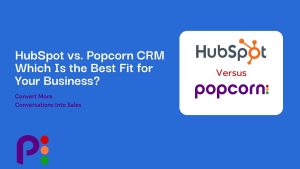Selling is reliant on forming a trust between you and the prospect: you set expectations with your advertising and try to appeal to the audience’s needs and wants. But you’re human, and so is the prospect, and the balance is delicate. In this article, we’ll be listing seven tips to help you meet the customer where they’re at and be the best salesman your customers deserve.
How to be the Best Salesman For Your Small Business
1. The Best Salesman Relies on Empathy
It goes without saying, but by far the most important attribute in a salesperson is their ability to connect with the prospect on a human level. People need connection, regardless of the situation!
The alternative, for a start, makes for a completely pointless conversation. Why even bother selling if you don’t want to hear what the prospect is saying? If you don’t care, then how can you convince them to buy from your business? You’re not going to put in the effort required; the prospect will notice this, and switch off too, meaning you are wasting their time, and your time too.
Caring about the prospect and their situation will encourage you to put in the time, and effort, required to foster a genuine relationship between customer and business. Knowing you’ve contributed towards solving their problem will feel great, too; the reward won’t just be the purchase.
2. Prove You Listen
Part of building that trust with your prospect is proving you’re worth it. You are, after all, taking the time to find a lead, nurture them into a prospect, and attempting to convert them into a customer. You might as well commit to it.
Remember the important bits about your prospects: not just the obvious points, but the things that make them tick. It brings a little variety into your communication; it helps you target and segment your prospects; and it reassures your prospect that you see them as more than just a name to sell to—and the business is regarded with a warmer sentiment by extension. That puts you in good stead for any future transactions, and will even translate into a good reputation online when your customer shares that positivity to their network.
Listening to your prospects includes listening to their feedback. This can be valuable; they can help you improve for your next contact, and increase your chance of cinching that next sale as a result.

3. Understand Why
It’s crucial that you understand what the prospect wants/needs, and what you can offer—and the point at which these two meet. That’s why you need to have the two above points in the bag—you can’t understand if you don’t listen, and you won’t listen if you don’t care.
Understanding your prospect’s pain points, for example, proves you listen, but also identifies a way for you to empathise with them; you can then form that trust so necessary to customer-business relationships.
It also makes your nurturing much more focused. Your prospects are likely to have differing reasons that have led them to your business. Each of these needs a different approach. The more you can tune your selling to your prospect, the more you can understand each other, and hopefully see that your business is the best fit for their situation.
4. The Best Salesman Doesn’t Waste Time
Reaching out to a prospect doesn’t always guarantee a sale, and certainly not an immediate one. If you nurture them enough, and play your cards right, they’re likely to buy from you—eventually. That ‘eventually’ is part of the process, of course. It demands good timing.
You need to know when the prospect is interested: not after the moment has passed, and definitely not before they’re ready.
What are the consequences of getting the timing wrong? If you’re too late, they’ve moved on. They’ve bought something already, and they no longer need or want your input. But that doesn’t mean they won’t ever consider you again: the situation might arise again, or they might be unsatisfied with their purchase—in which you’re back in the running.
If you’re too early, you’ll be perceived by the prospect as having come on too strong, too sales, and as a result you’ve scuppered your chance of a transaction. Unfortunately, this can damage the prospect’s perception of your business more dramatically than if you’d been too late, reducing your chance of a sale in the future.
So it’s wise to avoid this predicament. To do this, a good salesman will look out for hints about what the prospect’s position in the customer buying cycle is. These can be engagement signals, activity detected in your CRM, or even certain behaviours or phrases in conversations. These clues all add up; as soon as the signs are there, a good salesperson will strike.
Popcorn in particular monitors your prospects, scoring them based on their activity across email and web page visits into three categories: ‘cool’ prospects, ‘warm’ prospects, and ‘hot’ prospects. This way, you’re not just relying on clues and instinct, but making informed decision from analyses based in evidence from your CRM—and increasing your chance of a sale as a result.
5. The Best Salesman Appreciates the Loyal Customers
Businesses are far more likely to be successful selling to existing customers than new customers (Invesp). It makes sense that your selling should be proportionate to that. Returning customers offer many benefits—but, crucially, you’ve already done the hard work. The time you spend on your returning customers can be dedicated to maintaining that and nurturing the trust they have in you. Instead of turning them from a stranger into a customer, you’re doing the groundwork for turning a customer into an advocate.
So don’t dismiss customer retention—some of your best selling can happen there!
6. The Best Salesman Guides and is Guided By the Prospect
Your marketing should have been doing its job nurturing your lead into a prospect, so when you get to the actual selling part, you have a variety of information already collected in your CRM to beef up your own findings.
Finding where your service/product and your prospect can meet in the middle is vital, such as knowing the specific benefits that will appeal to them as an individual. Prospects don’t always bring it up themselves, but that doesn’t mean they don’t count. In fact, you should be able to guide them to consider these options.
Are there any questions they’ll be asking? Knowing these will help your communication run smoother, of course. But are there any questions they should be asking? From these, you can direct your conversations in a way that both satisfies the prospect’s expectations, and your business’ offering.
A good salesperson will introduce prospects to new ideas that, ultimately, warm them to your business. A great salesperson will do this as naturally as possible, keeping the prospect front and centre in the conversation so it doesn’t come off as sales-y. Even better, if you can both contribute to the topic equally—or have the prospect contribute more—your prospect will feel some connection, and agency, to it. The emotional investment can make all the difference.

7. Know Your Stuff, And Show It
We all know what it’s like to be on the receiving end of a sales pitch you didn’t ask for. Our senses start tingling, and we detach from the conversation completely. So, ironically, the worst thing you can be as a salesperson in certain situations is… a blatant salesperson.
The difference here is what is ‘blatant’ and what is ‘balanced’. There is no doubt you’re going to have to ask sales questions, and no sales communication is going to be 100% smooth and conversational. You don’t want it to be: you have points to get across, and you have a job to do. But how you put your points across matters, and you need to adjust to what your prospects respond to.
People like honest. People like knowledge. If you sound like you know what you’re talking about, it goes a long way. There’s a reason why reviews are such a popular form of content, after all.
So if you do know what you’re talking about, demonstrate it! Resist slipping into the script and talk about your experience freely; get excited about what you liked, and what worked. Knowing your stuff also puts you in the perfect position to answer any questions; drawing on your own experience adds validity to what you’re pushing. That validity, in turn, bolsters that trust, and that, in turn, improves your relationship.
All of these accumulate to paint a picture of a competent, confident salesperson: good at what they do, good at connecting with the prospect, and confident in their CRM and what they’re selling. Ultimately, being the best salesperson isn’t about using the best words or most prospects. It’s about that connection with the prospect; understanding who they are, why they’re taking a chance on you, and how you can meet them to bring them where they need to be. Investing the time in your prospects, and fine-tuning your responses to them, will pay dividends.
Enjoyed this post? Comment below or read through our blog for more lead management and CRM tips, especially for small businesses.
Disclaimer: Use of ‘salesman’ in this article has been included for SEO purposes only.











